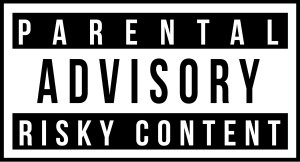Risky Business: Taking Risks with Your Writing
Do you engage in risky writing? Or, more to the point, should you?
I’m not talking about Charlie Hebdo-style cartoons, or even the kind of novel that forced Salman Rushdie into hiding for years. I’m talking about garden-variety edginess for rhetorical effect: strong language, subtle references to sex, drugs, alcohol, bodily functions, taboos of various kinds… you get the idea. Where do you draw the line? How far (and how often) do you cross over it before a little bit becomes too much?
The answer all depends on who your target audience is, your overall purpose in communicating with them and the specific effect you are trying to achieve by “crossing the line.”
Purpose
I’ll start with the communication purpose, because that’s the easiest to suss out. After all, you wouldn’t be writing if you didn’t have some kind of purpose behind it. And not just “to make money.” Although it may be true, as Samuel Johnson said, that “No man but a blockhead ever wrote, except for money,” everything you write should have a specific communication purpose; namely, what you want your audience to think or do after reading your writing. If your purpose is to shock or titillate, then obviously the raunchier the better. Once you move away from that, though, you have to think more about your readers: who they are and what you are trying to convey to them.
Audience
There are many ways to characterize your audience: age, socioeconomic background, native language, education and more. Assuming you know this level of detail about your readers, you may be able to gauge how they might react, and whether that reaction fits with your purpose. Whether your purpose is to inform people or encourage them to buy something, if a joke about PMS will get them there, go for it.
The trouble is, you rarely know that much about your readers, especially if your fan base is quite large. If your likely readership would be offended or mystified by such a joke, it might be better to find a different hook.
It usually boils down to this: The larger your audience, and the more your livelihood depends on getting that audience to respond positively to your writing, the better it is to stay on the safe side.
Changing Attitudes
A look at the way popular culture has changed over time would lead you to believe that we as a society have become less puritanical than we used to be, and in many ways that’s true. How many times did you see a toilet in an episode of “I Love Lucy,” let alone hear one flush? Henry Miller’s Tropic of Cancer (1934) was banned for years in the United States, but wouldn’t raise any eyebrows if it were first released today.
Attitudes go the other way, too. Do a search for “sexist advertisements” and you will find many examples from the 1950s and 60s that few newspapers would accept today. The bottom line is to keep your finger on the pulse of your audience; what doesn’t work for them today just might next year.
Specific Effects
When you’ve made the decision to include edgy elements in your writing, you should think carefully about what you are trying to achieve with each one. Is it just funny? (A perfectly legitimate reason, especially if your overall purpose is to amuse.) Will it make people remember your piece? Are you provoking to illustrate a point? If you can’t think of a good reason for having some spice in there, you probably ought to leave it out.
Morris Vaughan is a technical writing consultant in Los Angeles, California.

